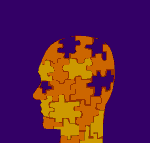 Brain Health and Balance
Brain Health and Balance 
“I want the best for my brain; what should I do to preserve brain health?”, you may ask.
Part 3: Best PHYSICAL Exercise for my Brain?: Enriched/Challenging environment exercise.
Here’s the straight scoop. This is what we know on Physical Exercise(1):
- Physical exercise on your free time helps your brain, a lot.
- Physical Exercise at work is not enough to help your cognitive (thinking) brain function.
- Running around (aerobic) seems to be better than stationary resistance exercise (isometric) (1).
Here’s the takeaway for resistance training (aka weight lifting), Balance and Core training:(4)
- Resistance training (aka weight lifting) is good for your brain
- Balance exercises, core toning, and stretching are are not sufficient to improve [cognitive] brain health… but they are great and important for other things
Here’s the takeaway for HOW LONG you must train to get benefits:
- 6 minutes of hard aerobic exercise (70% of max) improves brain function, at least for a time and for recent exposure to information
- 6 months of exercise for brain speed and brain inhibition
- 12 months of exercise for some other brain improvements
So what is the BEST Exercise Regimen for Brain Health?
Well we can’t answer that with certainty now. In fact, it will depend on a number of factors, but what I can tell you is some special techniques that turned a non-beneficial exercise into a beneficial one.
And, just so you know, I am holding back on you. There are “secret” brain boosters/protectors in the Food, Drink, and Sleep categories, but I am limiting this post to exercise (brain and body) for now. I will get that information to you soon, and it will hold some surprises.
“Enriched environment” is key
This is a case of science proving common sense.
What muscle is going to be more strong, stable, and adaptable:
- One that moves in one direction and one speed each time it is exercise?
- Or one that moves in multiple directions, multiple different speeds, and is challenged by varying outside forces?
Or think about a soccer player or a piano student. Which one is going to be more strong, stable, and/or adaptable:
- The one with varied challenges added in on top of previous skills?
- Or the one with only one skill challenged at a time?
Both of those examples actually involve brain training and growth.
But, specifically, what’s better for brain growth:
- Just exercising the muscle-activating portion of your brain to move your muscles during exercise?
- Or exercising multiple areas of your brain at once?
Exercising multiple areas of your brain at once is what goes on with “Enriched Environment” exercise.
So, that’s key for us to do also.
Enriching the environment for brain boosting involves using other areas of the brain, including :
- Sensory functions (sight, hearing, touch, smell, taste, and balance)
- Balance is really a combination of several sensory and motor functions. That’s why is can be so helpful.
Here’s the takeaway for THE BEST PHYSICAL and MENTAL EXERCISE for your brain:
- Exercise that pushes you to the limit:
- Bursts of intense exercise (ballistic, plyometric, high intensity, intervals) – ex. is Peak 8 by Mercola
- or VERY slow but doing each exercise to EXHAUSTION (i.e. can’t do another with good form) – ex. is Slow Burn by Fred Hahn (for purchase)
- Exercise that challenges multiple parts of your brain
EXAMPLES include:
- Exercise where you must make decisions
- Outside where you must avoid obstacles and interact with people
- Lots of sports will fit into this category. Exercising your body moderately or forcefully while contemplating the next move and predicting the next moves of opponents is definitely great brain exercise. The problem arises if you reverse the benefit by crashing your head repeatedly against something (the ground, another person, or a ball) that tears and inflames brain nerves.
References:
- Dementia and Alz Risk reduction: http://www.thelancet.com/journals/laneur/article/PIIS1474-4422(05)70203-9/fulltext#bib1
- 27-study review – http://www.ncbi.nlm.nih.gov/pmc/articles/PMC3990369/
- Manual Labor and Dementia – http://www.ncbi.nlm.nih.gov/pubmed/12541276
- Complex work with low education – http://www.ncbi.nlm.nih.gov/pubmed/19454849
- Weights vs. Balance, Core, ad Stretching – http://archinte.jamanetwork.com/article.aspx?articleid=415534
- Mercola on Super slow Weights – http://fitness.mercola.com/sites/fitness/archive/2012/05/11/benefits-of-super-slow-workouts.aspx
- Fred Hahn push-up example – https://www.youtube.com/watch?v=mYElsimFNQ0
- Fred Hahn’s DVD set – http://www.seriousstrength.com/site/store/videos/
- 200% Memory improvement – http://www.ncbi.nlm.nih.gov/pmc/articles/PMC3951984/pdf/nihms498587.pdf




